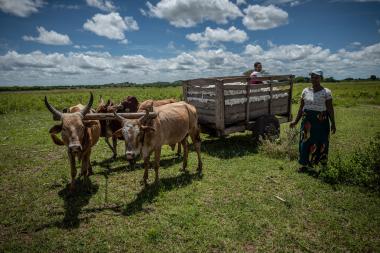Dibella increases purchase of Cotton made in Africa Cotton
- Dibella increases the use of Cotton made in Africa cotton according to the mass balance system from 300,000kg in 2023 to 750,000kg in 2024.
With Cotton made in Africa (CmiA), Dibella is making its business model even more sustainable. This enables the company to minimise its environmental impact and support the people in the growing regions. Dibella relies on the CmiA mass balance system in the chain to achieve its corporate goal of "increasing the use of sustainable fibres".
Cotton made in Africa initiative is an internationally recognised standard for sustainable cotton grown by African smallholder farmers. With up to 13% less greenhouse gas emissions, CmiA-verified cotton has a significantly lower impact on the environment than the global average and also supports village communities in Africa beyond sustainable cotton cultivation. CmiA supports smallholder farmers in sub-Saharan Africa in the sustainable cultivation of genetically unmodified cotton and is committed to improving working conditions in ginning factories. Through a licence fee, which is paid by customers like Dibella, the farmers receive training and access to operating resources in order to reduce the use of pesticides and increase the quality of their cotton and yields from their fields at the same time.
Cotton made in Africa takes a pragmatic approach to the processing of its cotton with two different models in order to best meet the demands for transparency and feasibility in the chain: The Hard Identity Preserved System and the Mass Balance System; Dibella has opted for the latter. While CmiA-verified cotton is always traded separately from other cotton right up to the spinning mill and can therefore be traced seamlessly from the growing region to the ginning plant to the spinning mill, the mass balance system allows CmiA cotton to be mixed with cotton of other origins at the spinning mill level as long as a balance between cotton purchases and CmiA-labelled yarns is ensured. This principle ensures the purchase of sustainably grown fibres and helps Dibella to bring a larger quantity of sustainable cotton into its textile cycle, which ultimately benefits smallholder farmers.
Dibella GmbH








